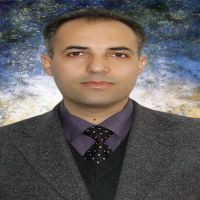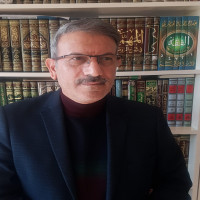Issue Editorial Board




1992 yılında Samsun ili 19 Mayıs ilçesinde doğdu. İlk, orta ve lise öğrenimini Samsun 19 Mayıs’ta tamamladı. 2014 yılında Erzincan Binali Yıldırım Üniversitesi İlahiyat Fakültesi’nden mezun oldu. 2015 yılında Öğretim Üyesi Yetiştirme Projesi (ÖYP) kapsamında Bitlis Eren Üniversitesi İslami İlimler Fakültesi Tasavvuf Anabilim Dalı’na Araştırma Görevlisi olarak atandı. ÖYP kapsamında 6 ay süre ile Yalova Üniversitesi’nde Arapça eğitimi aldı. Van Yüzüncü Yıl Üniversitesi’nde Tasavvuf alanında Prof. Dr. Ferzende İDİZ danışmanlığında hazırlanan “Tasavvufî Düşüncede Fenâ Kavramı” adlı teziyle yüksek lisans eğitimini (2019); “Hint Alt Kıtası Sûfîlerinden Şeyh Muhammed Gavs ve Tasavvufî Görüşleri” adlı çalışmasıyla da doktora programını (2024) tamamladı. 14.02.2025 tarihinden itibaren Bitlis Eren Üniversitesi'nde Dr. Öğretim Üyesi olarak çalışmaya devam etmektedir. Evli ve bir çocuk babasıdır.
Issue Reviewers





 Web
Web
İslami İlimler Alan Editörü



 Web
Web
Ankara Üniversitesi İlahiyat Fakültesi'nden mezun oldu. 2015 yılında Diyanet İşleri başkanlığı bünyesinde yer alan Konya Selçuk Dini Yüksek İhtisas Merkezinde 3 yıl Arapça ve Diğer İslami İlimler eğitimi aldı. Konya Necmettin Erbakan Üniversitesi Sosyal Bilimler Enstitüsü İslam Hukuku Anabilim Dalında Yüksek Lisans Eğitimini 2017 yılında tamamladı. Necmettin Erbakan Üniversitesi Sosyal Bilimler Enstitüsü Tefsir Anabilim Dalında Doktora eğitimini 2022 yılında tamamladı. 2021 yılında Anadolu Üniversitesi Adalet bölümünden mezun oldu. Diyanet İşleri Başkanlığında vaizlik ve Uzman vaizlik gibi görevlerde bulunduktan sonra 2024 yılında Kırıkkale Üniversitesi İslami İlimler Fakültesi Kur'anı Kerim Okuma ve Kırâat İlmi Anabilim Dalına Dr. Öğretim Üyesi olarak atanmış olup halen bu görevine devam etmektedir.




Prof. Dr. İshak ÖZGEL
20/08/1969 yılında Van’da doğdu. İlkokulu İstanbul’da Hekimoğlu Ali Paşa İlkokulu’nda okudu. Ardından Nuruosmaniye Kur’ân Kursu’nda hafızlığını ikmal etti. Orta ve lise tahsilini İstanbul İmam Hatip Lisesi’nde tamamladı. 1989 yılında Marmara Üniversitesi İlahiyat Fakültesi’ne girdi. 1993 yılında bu Fakülteden mezun oldu.
1996 yılında Uludağ Üniversitesi, Sosyal Bilimler Enstitüsü, Temel İslam Bilimleri Ana Bilim Dalı, Tefsir Bilim Dalı’nda hazırladığı “Büyük Selçuklular Dönemi Müfessirleri” adlı Yüksek Lisans Tezi ile bilim uzmanı ünvanı aldı.
2002 yılında Süleyman Demirel Üniversitesi, Sosyal Bilimler Enstitüsü, Temel İslam Bilimleri Ana Bilim Dalı’nda “Kur’an’ın Tarihsel Yorumu” adlı doktora tezi ile Doktorasını tamamladı. 2003 Yılında Aynı fakültede Tefsir Ana Bilim Dalı’nda Yrd. Doç. Kadrosuna atandı. 2011 yılında doçentlik sınavını başararak bu ünvanı alan Özgel 2015 yılında Profesör oldu. Halen bu fakültede çalışmalarına devam etmektedir.
1994 yılında M.E.B kısa dönem bursları ile üç ay Mısır, 90 gün Tunus’ta, 1999 yılında kendi imkanları ile İngiltere’de, 2006 yılında Yine M.E.B. bursu ile bir yıl Ürdün’de dil eğitimi ve alanı ile ilgili çalışmalar yapmıştır. İki çocuk babası olan Özgel İngilizce ve Arapça bilmektedir

Aim & Scope
The Journal of Quran and Sunnah Studies (JQSS) is a journal established to publish all kinds of scientific articles, translations, introductory/criticism and commemoration articles and series of articles through open access, with an understanding that will blend our ancient scientific knowledge and centuries-old scientific tradition with the perspective of the integrity of the Quran and Sunnah and entrust it to the future.
The Journal of Quran and Sunnah Studies will include all kinds of academic and scientific studies that have a scientific perspective and academic style, and are in line with research ethics, on fundamental Islamic sciences in particular and social and human sciences in general. The journal began its publication life with the aim of addressing the scientific richness of Islamic thought on a universal scale with an analytical method and presenting the intellectual accumulation of this richness with an analytical perspective. The Journal of Quran and Sunnah Studies will include; original research and review articles written in fields such as Islamic religion, thought, philosophy, history, geography, science, art, aesthetics, literature; copyrighted and translated articles on fundamental religious, scientific, social and cultural issues of Islam, aiming to introduce Islam with its true identity, never published anywhere before; scientific introduction and criticism articles on books published in Turkey or abroad; introduction, analysis and criticism articles on scientific activities such as symposiums, panels and conferences; and interviews with scientific content. The special scope of the journal covers theological disciplines such as Tafsir, Hadith, Theology, Islamic Law, Sufism, Islamic History and Arts, Islamic Philosophy, Philosophy of Religion, Religious Education, and History of Religions.
Author Guidelines
Ethical Principles and Publication Policy
Price Policy
The journal does not charge any fees for publication.



